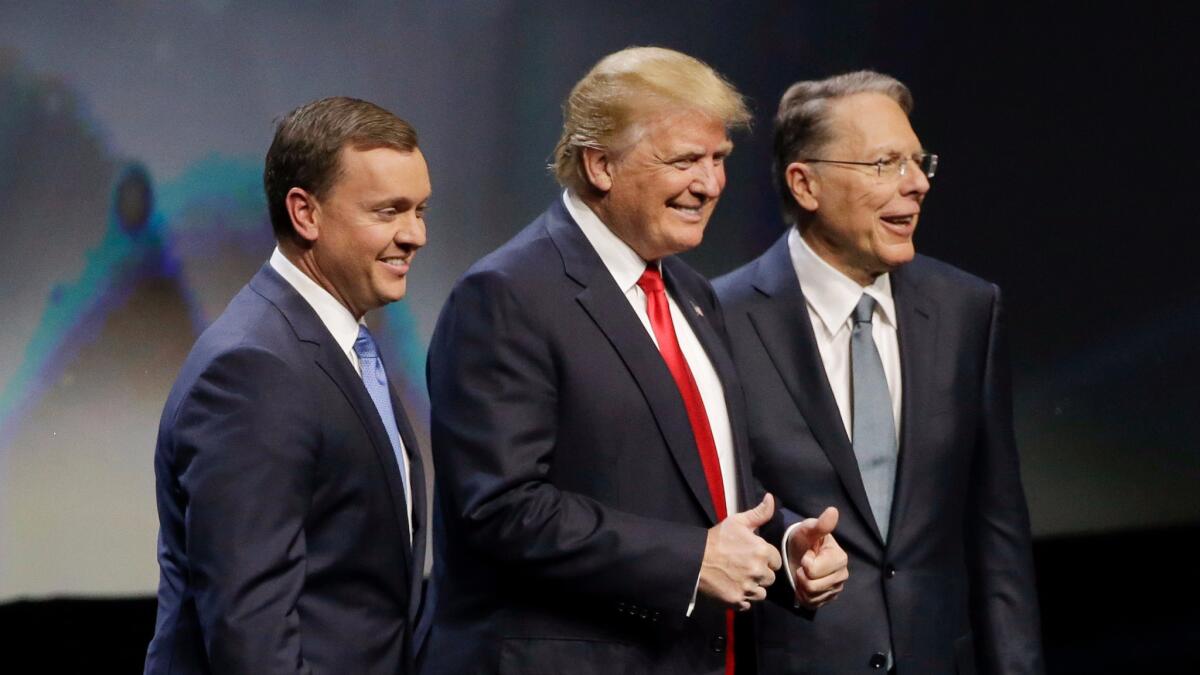Op-Ed: The science behind Donald Trump’s ‘us versus them’ rhetoric

- Share via
International trade is a salient political issue in 2016. Donald Trump and Bernie Sanders are grafting discontent in the electorate to dissatisfaction with the forces of globalization. Economic anxiety is surely part of the story. But campaign rhetoric about trade — and in particular, the way the Trump camp has been framing the issue — reveals that a great deal more than financial insecurity is shaping public opinion.
While Sanders ties his protectionist stance to a broad anti-corporate message, Trump’s language is decidedly “us versus them.” According to the Republican candidate, America is “losing all over the world” in trade, foreign countries are “stealing” American jobs, and every country (“you can just pick a name out of a hat”) is beating the United States in this domain. President Obama in his Rutgers University commencement address last Sunday highlighted the connection between Trump’s anti-trade rhetoric and the generally xenophobic posture of his campaign.
Negative attitudes toward “out groups” -- in other words, ethnocentrism, chauvinistic nationalism and generalized prejudice -- are strong predictors of trade protectionism.
The relationship between prejudice and protectionism, however, can be confirmed by more than just anecdotal evidence or casual observation. A series of studies by both political scientists and economists have found that negative attitudes toward “out groups” — in other words, ethnocentrism, chauvinistic nationalism and generalized prejudice — are strong predictors of trade protectionism. In several of these studies, the influence of such attitudes on trade opinion appears to greatly outweigh that of personal economic interests.Given what we know from psychology and behavioral economics, these findings are not surprising. In their Nobel-prize winning work, psychologists Daniel Kahneman and Amos Tversky argued that the human mind is lazy: We rely on shortcuts to avoid the effort of deliberate reasoning, unconsciously turning complex decisions into quick, intuitive judgments.
When it comes to judgments about foreign trade, the “foreign” aspect of the issue is what many of us find easiest to focus on, even if unconsciously. International trade is, after all, an interaction with “others.” Research on globalization opinion suggests that the average individual arrives at a position on trade not through rational (and mentally demanding) assessments of costs and benefits, but largely through gut-level decisions guided by attitudes toward out-groups and foreignness. The result is that insular individuals are far more likely to oppose trade than those with a cosmopolitan world view, all else being equal.
These findings shed considerable light on the public politics of trade. They tell us what kinds of messages are likely to shift trade opinion in a given subset of the population, and how various approaches to the issue can help one candidate but not another.
And this brings us back to Sanders and Trump. Both have found it politically effective to attack foreign trade, but each has espoused a very different brand of protectionist rhetoric. With an audience prone to xenophobic sentiment, Trump casts trade as a competitive game in which Americans need to fight back against foreign “others” who are stealing, cheating and outsmarting them. Facing a set of supporters who are much more comfortable with out groups, Sanders pulls on other levers: The villains in his story are not foreigners, but corporate interests perpetuating economic inequality.
The different attitudes of each candidate’s base may well explain why, at the end of the day, Trumps’ supporters are much more protectionist than Sanders’. A Pew Research Center poll conducted in March found that among Trump supporters, 67% believe that free trade deals have been bad for the United States, while only 38% of Sanders supporters hold that view.
Of course, the economic impact of expanded free trade is real, and a minority of Americans have suffered significant costs as a result. Out group attitudes, however, appear to explain the political response of trade’s economic victims. In a paper released last month, four leading economists found that voters in congressional districts hardest hit by globalization turned in subsequent elections to more extreme political candidates, but in different ways: Republican districts overwhelmingly elected more conservative representatives, while Democratic ones chose more extreme candidates from both sides of the political spectrum. One explanation for this pattern is that conservative districts are more likely to blame the negative consequences of trade on outsiders, turning more uniformly to candidates, especially from the Tea Party, who articulate resentment toward out groups.
Trade protectionism can be based on all kinds of factors — concerns over domestic inequality, human rights and environmental considerations, or good old-fashioned economic self-interest. But opposition to trade — and the politics that surround it — also has a whole lot to do with how people feel about folks different than themselves.
Shahrzad Sabet is a postdoctoral fellow at Harvard University’s Weatherhead Center for International Affairs.
Follow the Opinion section on Twitter @latimesopinion and Facebook
More to Read
A cure for the common opinion
Get thought-provoking perspectives with our weekly newsletter.
You may occasionally receive promotional content from the Los Angeles Times.









